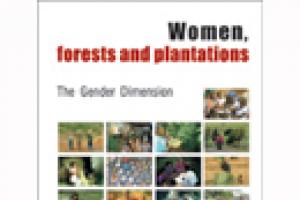By the World Rainforest Movement
Selection of articles published in the monthly electronic bulletin of the World Rainforest Movement, addressing the gender dimension of the impacts in the forests of plantations
Women, forests and plantations. The gender Dimension
Large-Scale Tree Plantations
Industrial tree plantations are large-scale, intensively managed, even-aged monocultures, involving vast areas of fertile land under the control of plantation companies. Management of plantations involves the use of huge amounts of water as well as agrochemicals—which harm humans, and plants and animals in the plantations and surrounding areas.
Publications
18 August 2005
By René Montalba Navarro, Noelia Carrasco Henríquez and José Araya Cornejo
By means of testimonials, documents and figures, the present report sets out the problems faced by that commune of 11,405 inhabitants, where monoculture tree plantations have expanded violently, imposed by a forestry development model instituted during the military dictatorship and still currently in force.
Bulletin articles
14 August 2005
Between 1994 and 2004 the land converted from native forests and farms to monoculture tree plantations in Tasmania has increased almost fourfold – to 207,000 hectares.
Most farms replaced were organic or used relatively few chemicals as compared to the highly chemically-dependent monoculture tree coupes that replaced them.
Bulletin articles
14 August 2005
Annexation of Mapuche territory by the Chilean State and the imposition of its legal system on all the indigenous peoples that co-exist in the country have marked deep changes in the way of life of the Mapuche people. Between 1881 and 1907, stripped of their territory, their autonomy and their assets generated as an agricultural and cattle-raising society, the Mapuche people fell prey to hunger and to disease that took around twenty thousand victims.
Bulletin articles
14 August 2005
The human health risks associated with plantations of genetically engineered trees, though virtually unstudied, are significant and further legitimize the call to globally ban GE trees.
The health risks can be broken down into the following categories: exposure to hazardous chemicals (such as the herbicide RoundUp) applied to the plantations; the harmful effects of inhaling pollen from trees that produce the bacterial toxin Bt; the risks associated with consumption of fruit from GE trees; and the threats of using antibiotic resistant markers in the development of GE trees.
Other information
14 August 2005
In 1999, the World Bank's Economics of Industrial Pollution Control research team published a report titled "Greening Industry". The report, which was the result of "six years of research, policy experiments, and firsthand observation", described Asia Pulp and Paper's PT Indah Kiat Pulp and Paper as a "success story".
Bulletin articles
14 July 2005
As reported in past WRM bulletins, Liberia’s forests have long been exploited to fuel conflict in this small West African country. Liberia houses the last two blocks of the upper Guinea Forest, which is known to be home to over 2,000 flowering plants, some 240 of which are timber species, and 60 of which have been commercially harvested.
Bulletin articles
14 July 2005
While accounts of illegal logging in southeast Asia’s and central Africa’s tropical forests, to supply the booming Chinese economy are increasingly common, this report is one of the first to document the “Chinese takeaway” from the semi-arid forests of Southern Africa. A four-months study of forestry in Zambezia province of Mozambique was conducted between November 2003 and October 2004.
Bulletin articles
14 July 2005
A recent study carried out in the South African tree plantation sector analyses the impacts of outsourcing on forestry --mostly women-- workers. The report points out that outsourcing in the forestry industry is in line with global business trends and serves to increase flexible employment terms for the benefit of the industry. Outsourcing also saves on cost of capital equipment and fixed costs associated with full-time employees, and avoids having to deal with labour legislation brought in by the Government.
Bulletin articles
14 July 2005
Exuberant and majestic forests span the province of Misiones on a plateau with altitudes of up to 800 metres. Its soil is reddish organic matter forming humus up to 30 cm thick that acts like a sponge, retaining water and minerals. Once the cradle of stories and myths, the forest of Misiones is now disappearing.
One of the factors causing its destruction is the large scale plantation of alien pine trees, most of which are intended for making pulp, while the others go to timber industrialization.
Bulletin articles
14 July 2005
What is happening in Brazil is a historic event, not only for Brazil, but for all of us who are struggling against the advance of large scale monoculture tree plantations.
Bulletin articles
14 July 2005
Between 17 June and 19 July 2005, Nippon Paper Group is asking for comments and suggestions on its draft "Philosophy and Basic Policy" on obtaining raw material for its pulp and paper mills. The company claims to be "engaging in a dialogue with stakeholders" and promises to publish responses to comments in September 2005 at the same time it publishes its "Philosophy and Basic Policy".


